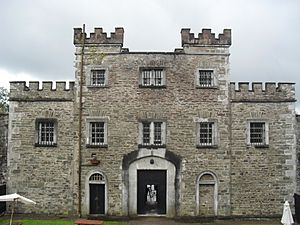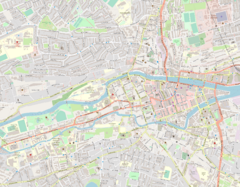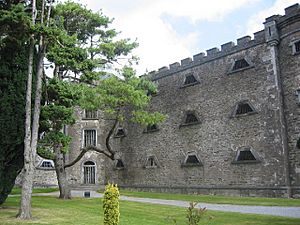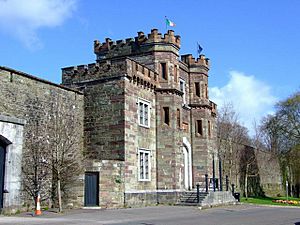Cork City Gaol facts for kids
 |
|
| Location | Convent Avenue, Sunday's Well, T23 VX25 Cork |
|---|---|
| Coordinates | 51°53′58″N 8°29′56″W / 51.899530°N 8.499022°W |
| Status | museum prison |
| Opened | 1824 |
| Closed | August 1923 |
Cork City Gaol is a historic building in Cork City, Ireland. It used to be a prison but is now a popular museum. It teaches visitors about what life was like for prisoners long ago.
Contents
Building a New Prison in Cork
In 1806, people in Cork decided they needed a new prison. The old one was almost 100 years old, too small, and not very clean. It was called the North Gate Bridge Gaol.
Choosing the Best Location
At first, they picked a spot near a distillery. But this area often flooded, so it wasn't good for a prison. They finally chose a place called Sunday's Well. This spot was high up, which people thought would help stop the spread of sicknesses like "jail fever" (a type of typhus).
Designing the Gaol
Work on the new prison started in 1816. The main building began in 1818. William Robertson from Kilkenny designed the prison. The famous sculptor John Hogan even worked on the plans as a draughtsman.
Inside the Cork City Gaol
The new Cork City Gaol opened its doors in 1824. People at the time said it was "the finest in 3 kingdoms." This meant it was considered one of the best prisons in Ireland, England, and Scotland. In 1870, part of the prison was updated with new cells.
Who Was Held Here?
When the prison first opened in the 1820s, it held both men and women. These prisoners had committed crimes only within Cork City. If someone committed a crime outside the city, they went to the Cork County Gaol. This other prison was across the river, near University College Cork.
Famous Prisoners in the 1800s
One well-known person held at Cork City Gaol was Brian Dillon. He was a member of the Fenian movement, a group that wanted Ireland to be independent. He was arrested in September 1865.
Becoming a Women's Prison
Things changed for Cork City Gaol in 1878. A new law called the General Prisons (Ireland) Act reorganized prisons in Cork. Cork City Gaol became a prison only for women. It held women from both Cork City and Cork County. The men's prison for both areas became the Cork County Gaol. On the day this change happened, male prisoners walked out of Cork City Gaol and women prisoners walked in.
Life for Women Prisoners
Many women prisoners in the late 1800s were locked up for minor offenses. These were often things that wouldn't lead to prison today. For example, some women were imprisoned for using "obscene language" or for "drunkenness."
Women During the Fight for Independence
During the Irish War of Independence, many women who supported Irish freedom were held here. In October 1919, Constance Markievicz was imprisoned at Cork Gaol. She was the first woman ever elected to the British Parliament. She was arrested for giving a speech that authorities considered rebellious. Another Republican woman, Mary Bowles, was imprisoned in January 1919 for weapons offenses. Later that month, a prisoner named Dolly Burke managed to escape from the prison.
The Irish Civil War and Escapes
In 1922 and 1923, during the Irish Civil War, the prison held both male and female Republican prisoners. These were people who did not agree with the treaty that ended the War of Independence.
A Writer in Prison
One of the famous people imprisoned at this time was the writer Frank O'Connor.
A Daring Escape Story
In November 1923, a very exciting escape happened at the jail. Some prisoners, who were considered very important, were sent to Cork City Gaol because it was thought to be the safest place. On the night of the escape, some men pretended to be sick. They made a rope ladder to climb the outer wall. They also used bed sheets to climb down to the ground. The prisoners had to move carefully in the shadows, watching out for a guard. They went in groups of fourteen, as this was how many could hide in the wall's shadow. The most wanted men went first. After three groups, a total of forty-two men had escaped! It was a cold night, and they had to travel without shoes. Some of the escapees from Cork City managed to get away before morning. However, some from the last groups were caught later that day.
The Cork City Gaol officially closed in August 1923. All the remaining prisoners were either set free or moved to other prisons.
After the Prison Closed
After 1923, the prison building found a new use. From 1927, the top floor of the Governor's house became a radio station. It was called 6CK, and it was the first official radio station in Cork. Later, it became part of a national radio station, Radio Éireann (now Raidió Teilifís Éireann). Radio broadcasting continued at the jail until the 1950s.
After the radio station left, the jail complex was mostly left empty and became quite run down.
Becoming a Museum Today
In 1993, the historic building was reopened to the public. It is now a popular visitor attraction and museum. It allows people to step back in time and learn about the history of crime and punishment in Cork.
Notable People Held at Cork City Gaol
- Brian Dillon, 1865
- Constance Markievicz, 1919
- Frank O'Connor (born Michael Francis O'Connor O'Donovan), 1923
 | Lonnie Johnson |
 | Granville Woods |
 | Lewis Howard Latimer |
 | James West |




